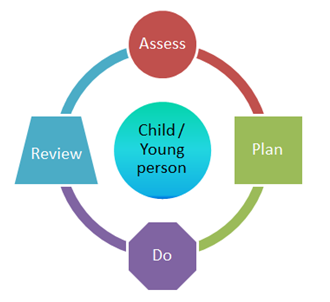The graduated approach
In keeping with the social model of disability, which seeks to remove barriers to access for children with additional needs, this toolkit defines and promotes High Quality Teaching (HQT) and reasonable adjustments as well as evidence-based interventions to ensure the vast majority of children have their needs met within inclusive community schools and settings.
Whilst every stage within the graduated approach is critical, the very best reviews ensure that the plan (do) is adjusted according to progress towards outcomes. This toolkit recognises the fact that there is no one size fits all approach to meeting individual needs and therefore identifies a comprehensive range of evidence-based strategies, only a proportion of which would ever feature within a single plan. This is designed to provide SENCos with the widest possible range of option as they review and adjust support plans within cycles of the graduated approach. Of course, in all of this, hearing the voice of child and family as the experts is key to success. "Kids do well if they can" (R Greene, 20018, Lost at school, Blackwell's) and families have a deep understanding of what helps and what hinders positive engagement, as do children themselves.
SENDCoS should draw on the full range of strategies up to and including the identified level of need rather than restrict their planning to that section only. For example, specialist interventions (5-6) will be underpinned by high quality teaching strategies and targeted interventions.
Any skills developed through intervention need to be consolidated within the setting. Whilst every child is unique, there are teaching and learning approaches which research confirms optimise the learning environment for children with additional needs.


